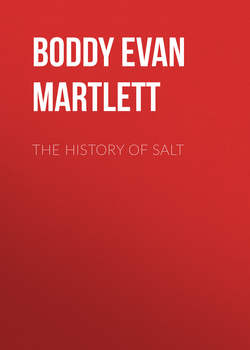Читать книгу The History of Salt - Boddy Evan Martlett - Страница 1
CHAPTER I
INTRODUCTION
ОглавлениеHow frequently it happens that those natural productions with which we are to a certain extent superficially familiar, are to a great many not only uninteresting, but are regarded as subjects more or less beneath their notice; and by others as deleterious to the human race, and therefore to be cautiously used or scrupulously avoided. Another peculiarity is, that the more we are accustomed to them, the more our interest wanes, and probably at last degenerates into apathetic indifference.
We can only attribute these ignorant conceits and apparently unaccountable obliquity of judgment to two causes: an assumption of wisdom, and an unenlightened mind, unwilling to learn and loath to improve. Another hindrance which to a considerable extent precludes the study of what one may truthfully designate every-day subjects, is the restless furor for artful counterfeits of science, which are nothing else than the emanations of vain and visionary minds mixing together, as it were, an amalgam of truth and error. The present age is wonderfully productive of these eccentric ideas, while at the same time it is unhappily pregnant with the most unnatural and anti-healthful habits. The mystified authors take good care to run into the wildest extremes, so that their marvellous schemes and quaint devices (fortunately for their fellow-creatures) cause them to be justly derided by the thoughtful and disregarded by the sensible, though not a few are caught by the tinsel.
The grotesque aberrations of thought which have so prolifically generated such an incongruous medley of medico-social phantasmagoria, though considered by their promoters as wonderful scientific projections, are rendered more ridiculous than they really are, by their wild and unreasonable denunciations of those who do not happen to coincide with their farcical puerilities and whimsical crudities; and their intolerant followers, with considerable more zeal than discretion, promulgate their doctrines with voluminous additions and preposterous assertions —mentis gratissimus error.
These parodies of science have exerted as yet no material influence on modern thought, though there is a visible impress observable here and there; and they doubtless will ultimately collapse, like alchemy and other illusions of a bygone age, and in due time will fall as ignominiously before the resistless onslaughts of true science and knowledge, as those deceptive will-o’-the-wisps were finally extinguished, after whisking about for some centuries, by the calm, dignified, and logical condemnation of philosophical and scientific investigation. Need I remind my reader that I am referring to spiritualism, homœopathy, vegetarianism, and various other bastard distortions of science, though their purblind believers may regard them as legitimate offspring, and therefore deserving of due respect and consideration. Such imaginative plerophory is invariably antagonistic to scientific conclusions and common-sense principles, beside being redundant of inane folly and trivial hyperbole.
One of the peculiar crazes of the day, though it is not so universal as those to which I have just referred, is the unhealthful and insensate antipathy to salt, which has infatuated, in a greater or lesser degree, the several strata of society: some going so far as to proscribe it altogether, whilst others use it as if it were destructive to life, or at least subversive of health, and others assert that it originates disease! Some time ago I saw a letter in a temperance journal (we know that the advocates of total abstinence are frequently guilty of degrading their good cause by descending to frivolity), advising total abstention from salt; the writer, with amusing self-complacency, accused it of producing evils of an astounding nature – such is the latitude of pragmatical ignorance and silly egotism. The palpable absurdity of such an argument must be apparent even to the most careless thinker; it is with the view of exposing such a fallacy, both injurious and irrational, that I have written this treatise, and have been prompted to do so more especially as I find such ridiculous notions find great favour with those from whom better things ought to be expected.
I have laboured under many difficulties, owing to the meagre accounts concerning the history of this most important article of diet; no doubt arising from the fact that it has not been studied with that attention which it manifestly deserves; consequently I have been obliged to allude to the pages of Holy Writ, not that I wish to base my arguments on religion, but simply because we find therein the primary mention of salt, both as a purifying agent and as a condiment to food.
Reverting to the Bible on subjects of scientific import frequently brings down upon the author ill-timed ridicule, especially from those who profess a belief in nothing except their own crude notions; a fact which is surprising, for here we possess a Book which has stood the test of ages, which has weathered many a storm, which has victoriously emerged from many a conflict, and which has indeed passed through an ordeal which no other volume has been called upon to do – all indicative that it emanated from a mind immeasurably superior to that of man; and thus I am quite content to bear with any amount of satire, however pointed and keen, if I have it on my side of the question, which undoubtedly is the case respecting the medicinal and dietetic properties of salt: besides, when it is pronounced to be “good” by the Divine Speaker, one need not care an iota for those who assert that it is pernicious, however plausible or apparently logically conclusive their arguments may be.
